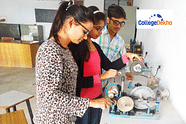AP EAPMCET 2025 physics syllabus holds topics like kinematics, laws of motion, gravitation, thermal properties of matter, thermodynamics, waves, electric charges and field, etc. The physics section will hold 40 questions from AP EAMCET physics syllabus.

AP EAMCET 2025 Physics Syllabus -
The AP EAPCET 2025 Physics syllabus includes courses from the 10+2 level. The AP EAMCET 2025 will be conducted for 160 marks, with the Physics section worth 40 marks. The complete syllabus of AP EAMCET Physics 2025 can be found here, along with a list of chapters and topics. Chapters or topics from the Intermediate first- and second-year Physics, Chemistry, and Mathematics syllabus make up the AP EAMCET 2025 syllabus. As a result, the candidates must give the Intermediate first-year course the same importance. With a proper study strategy, preparing for
AP EAMCET (EAPCET) 2025
is not a difficult task, and one can revise the full Physics syllabus in 30 days. On this page, you can find all the information on the AP EAMCET's Physics syllabus. '
Check Also:
Topics to Score 35+ Marks in AP EAMCET Chemistry 2025
Latest update:
AP EAMCET 2025 exam date has been announced. AP EAPCET 2025 Agriculture & Pharmacy exam will be held on
May 19 and 20, 2025
and the AP EAMCET 2025 Engineering exam will be conducted from
May 21 to 27, 2025
.
Jawaharlal Nehru Technology University, Kakinada, administers the state-level entrance exam known as AP EAPCET. To systematically study the most important topics, students can download the AP EAPCET syllabus 2025 .
AP EAPCET Physics Syllabus 2025 PDF Download
Check the Physics AP EAPCET Physics Syllabus 2025 PDF below.
AP EAPCET (EAMCET) Physics Syllabus 2025
Physics is common in both the Engineering and Agricultural exam papers. In both papers, an overall of 40 questions will be asked. These questions will carry 1 mark. But, there is no negative marking.Chapter | Sub-Topics |
|---|---|
Dimensions and Units, Measurements |
|
Elements of Vector |
|
Kinematics |
|
Laws of motion |
|
Energy and Power, Work |
|
Gravitation |
|
Mechanical Properties of solids |
|
Mechanical Properties of fluids |
|
Thermal Properties of Matter |
|
Thermodynamics |
|
Kinetic Theory |
|
Waves |
|
Ray Optics and Optical Instruments |
|
Wave Optics |
|
Electric Charges and Fields |
|
Check Also: Topics to Score 35+ Marks in AP EAMCET Physics 2025
AP EAMCET Physics Important Topics 2025
Some of the important topics of AP EAMCET 2025 based on previous years' trends have been listed below. Candidates are advised to head them for reference purposes. The weightage may differ from year to year.
| Chapter | Weightage (Approx) |
|---|---|
| Thermodynamics | 9% |
| Physical World | 1% |
| Waves | 4% |
| Motion in a straight line | 3% |
| Waves Optics | 3% |
| Laws of Motion | 5% |
| Work, Energy, and Power | 6% |
| Electromagnetic Induction | 3% |
| Semiconductor Electronics | 3% |
| Gravitation | 4% |
| Mechanical Properties of Solids | 2% |
| Mechanical Properties of Fluids | 3% |
| Thermal Properties of Matter | 3% |
| Units and Measurements | 2% |
| Motion in a Plane | 5% |
| Kinetic Theory | 2% |
| Ray Optics and Optical Instruments | 3% |
| System of Particles and Rotational Motion | 6% |
| Electric Charges and Fields | 3% |
| Oscillations | 4% |
| Current Electricity | 4% |
| Moving Charges and Magnetism | 5% |
| Magnetism and Matter | 2% |
| Atoms | 2% |
| Alternating Current | 3% |
| Electromagnetic Waves | 2% |
| Dual Nature of Radiation and Matter | 3% |
| Nuclei | 3% |
| Electrostatic Potential and Capacitance | 4% |
| Communication Systems | 3% |
AP EAMCET 2025 Physics Best Books
While there are a lot of best books for AP EAMCET preparation 2025 out there in the market to help candidates prepare well for the exam, here is a list of some of the best AP EAMCET physics books which will aid candidates in securing a good rank in AP EAMCET 2025.
Name of the Book | Name of the Author/Publisher |
|---|---|
Problems in Physics | S.S. Krotov-HC Verma |
EAPCET Physics (Andhra Pradesh & Telangana) | Arihant Experts |
Physics for IIT-JEE | Resnick Halliday, Walker |
IIT JEE Physics | DC Pandey |
Problems in General Physics | I.E. Irodov |
EAPCET Physics (Andhra Pradesh & Telangana) | Arihant Experts |
Concepts of Physics (Volume – 1 and 2) | HC Verma |
Key Notes Terms, Notes, Formula | Arihant Experts |
Key Notes Terms, Notes, Formula | Arihant Experts |
AP EAMCET 2025 Physics Preparation Tips
Candidates appearing for the AP EAMCET Physics paper must be well aware of the AP EAMCET Physics syllabus along with the high weightage topics. The candidates must refer to the best books available in the market to appear for the AP EAMCET 2025 Physics paper. Candidates must also undertake mock tests and practice AP EAMCET previous years question papers to get themselves accustomed to the AP EAMCET 2025 exam pattern and improve their time management skills.
Check Also: How to Score 35+ Marks in AP EAMCET (EAPCET) Chemistry 2025
AP EAMCET Marking Scheme
Candidates can check the marking scheme of AP EAMCET 2025 exam as provided in the table below.
Subjects | Total No Of Questions | Total Marks |
|---|---|---|
Physics | 40 | 40 |
Chemistry | 40 | 40 |
Mathematics | 80 | 80 |
Total | 160 | 160 |
Related AP EAMCET Articles,
For the latest news and updates, stay tuned to CollegeDekho.
Are you feeling lost and unsure about what career path to take after completing 12th standard?
Say goodbye to confusion and hello to a bright future!

FAQs
The syllabus of AP EAMCET can be challenging, but it is not necessarily difficult if you are well-prepared and have a strong foundation in the core subjects. The AP EAMCET exam evaluates your understanding of concepts and problem-solving skills in the subjects of Mathematics, Physics and Chemistry.
There is high competition surrounding the AP EAMCET exam as approximately two lakh candidates appear for this exam every year. To successfully ace the AP EAMCET exam, candidates require a concrete AP EAMCET study plan and timetable. Besides, candidates must be well acquainted with AP EAMCET syllabus and exam pattern.
If a candidate scores 40 to 49 marks in AP EAMCET, the expected rank can be between 30,001 to 40,000.
Dimensions and Units, Measurements, Elements of Vectors, Kinematics, and Laws of motion are some of the chapters covered in the AP EAMCET Physics.
The weightage of Physics in AP EAMCET is 40 marks.
Was this article helpful?


















Similar Articles
Polytechnic Courses 2025: Details, Fees, Eligibility, Admission Criteria
TS POLYCET 2025 (May 13): Hall Ticket, Pattern, Preparation, Result
AP ECET 2025: Exam Date, Syllabus, Eligibility, Exam Pattern
TS EAMCET 2025: Result (Out), Exam Dates (April 29 to May 4), Eligibility, Pattern, Preparation
TS EAMCET 2025 Exam Date (May 2 to 4): Result (Out), Counselling (Soon)
COMEDK UGET 2025 Exam Dates: Admit Card, Exam (Shift 2 Over), Result Date, Counselling